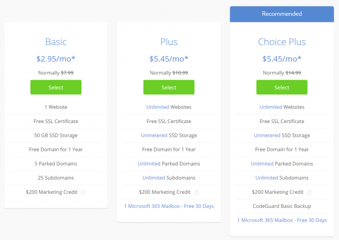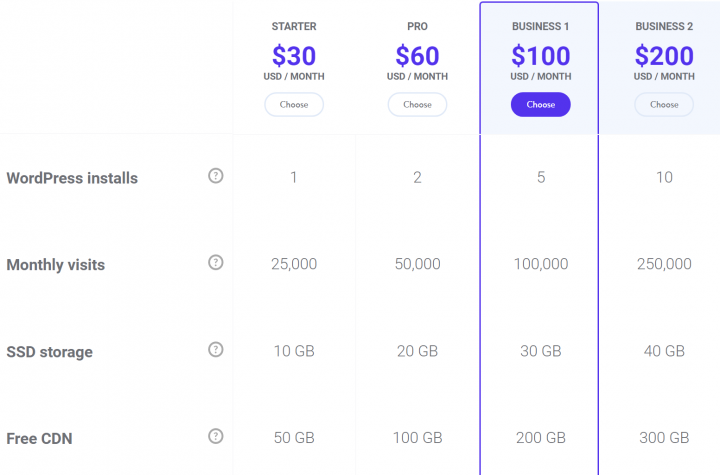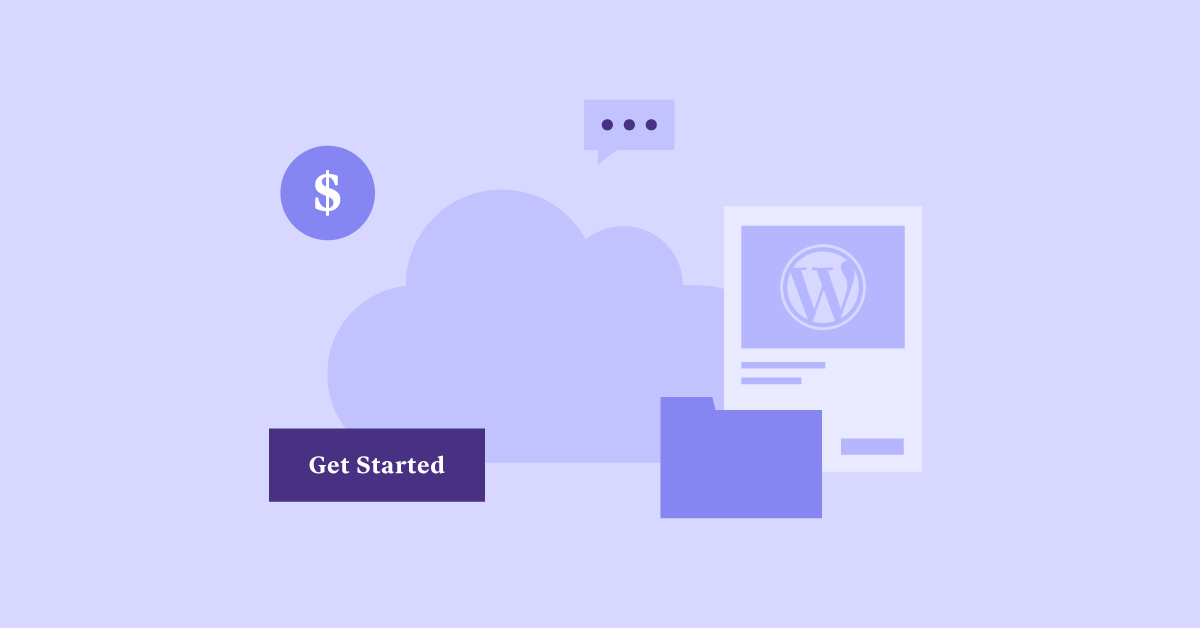If you want to make a WordPress website, you need WordPress hosting. In fact, since the WordPress software itself is free, hosting and a domain name are really the only two non-negotiable paid elements to launch a WordPress website.
That means that, when you’re trying to figure out how much your WordPress website will cost, the cost of WordPress hosting is going to play a big role in whatever number you arrive at.
So, what should you expect to pay for WordPress hosting? Well, it depends, which is why we wrote this post! Otherwise, we could’ve just answered the question in the first paragraph.
On the low end, you can find WordPress hosting for under $10 per month. However, it can also easily cost $30+ per month or even well into the hundreds per month for a high-traffic, mission-critical website like a WooCommerce store.
In this post, we’ll help you figure out the cost of WordPress hosting for your specific situation, as well as what factors go into determining the price of WordPress hosting and why there’s so much variation.
What Is WordPress Hosting?
At a high level, WordPress hosting is just hosting that’s optimized to run the WordPress software. At a bare minimum, that means it meets the WordPress software’s minimum requirements (which virtually all web hosts do).
However, most WordPress hosting goes beyond the bare minimum and also bakes in some WordPress-specific features such as a one-click WordPress installer, automatic updates to keep the WordPress software up-to-date, and maybe even some performance optimization strategies that are targeted towards WordPress.
Typically, basic WordPress hosts use a shared hosting environment, which keeps costs very low.
Then, there’s another more “premium” option called managed WordPress hosting. With managed WordPress hosting, you’ll get a more optimized environment with WordPress-specific performance and security rules, as well as useful features such as automatic backups and staging sites (a safe sandbox to test changes to your site).
How Much Does WordPress Hosting Cost?
In general, cheap shared WordPress hosting will cost $5 to $20 per month at full price. You can also typically pay much less for your first year (or two or three) because most shared hosts offer promotional prices for your first billing cycle.
For example, consider Bluehost, one of the most popular shared WordPress hosts and one of our recommended Elementor and WordPress hosts. Bluehost’s promotional prices range from $2.95 to $5.45 per month, while the full prices range from $7.99 to $16.99 per month.


However, as you can see, there’s a lot of variation. On one hand, Bluehost has promotional prices at under $3 per month. On the other hand, you see that Kinsta and WP Engine cost 10X that. So, why is there so much difference in the cost of WordPress hosting?
What Factors Determine the Cost of WordPress Hosting?
Let’s go through some of the biggest factors that affect the cost of WordPress hosting.
1. The Type of WordPress Hosting
One of the biggest high-level factors in the cost of WordPress hosting is the type of hosting that you’re purchasing. There are three main “types” of WordPress hosting for most users. We’ve ordered them roughly from the cheapest to the most expensive:
- Shared WordPress hosting – your site shares resources with other accounts/sites on the server, which is why shared hosting has the lowest WordPress hosting cost of any type.
- VPS/Cloud VPS WordPress hosting – your site gets dedicated resources from a slice of a single machine (a traditional VPS) or on a cloud network of multiple machines (a cloud VPS). While, like shared hosting, you’re only getting part of a machine, the key difference between a VPS and shared hosting is that the resources you’re allocated are 100% yours – you never need to share them with other accounts on that server/network.
- Managed WordPress hosting – a more premium offering, typically using some type of cloud hosting infrastructure and giving your site all the resources it needs. Your site may or may not have dedicated resources, but the host uses its technology to make sure your site is given extra resources during traffic spikes.
2. The Resources That Are Available to Your Site
In the previous section, we touched on what type of resources are available to your site. That is, with shared hosting, you have to share resources, while VPS hosting gives your site dedicated resources all to its own.
Here, we’ll go into more depth about how resources affect three important parts of your site:
- Performance
- Reliability (uptime)
- Scalability
Performance
Creating a hosting environment that can make your WordPress site load quickly requires more resources that can be dedicated to your site. Having more resources generally takes more money, which is why you usually need to pay a little more for high-performance hosting.
Again, the cheapest WordPress hosts are able to keep their costs low by “sharing” resources between multiple sites/accounts. However, if the host puts too many sites on the same server (which often happens with budget options), this means your site will load slower because there aren’t enough resources to go around.
If you’re trying to make money from your website, it often makes sense to invest in a host with more resources because how quickly your site loads will affect your conversion rates and user engagement metrics.
Reliability (Uptime)
Much of what we said about performance also applies to the reliability of your host. Ideally, you want your site to have 100% uptime, or as close to it as possible. However, creating a reliable network that never goes down also takes money and resources, which is why better reliability usually comes at a higher price tag.
Scalability
Scalability refers to how your site performs when under heavy traffic. A site that receives 1,000 visitors per hour is going to require a lot more resources than a site that receives 100 visitors per hour (though you can limit this with tactics like caching your site).
This means that if you have a high-traffic site, you’ll usually need to pay more for hosting to get more resources, at least if you want to avoid your site slowing down during peak periods.
Note – even though many cheap WordPress hosts might advertise “unlimited traffic”, you shouldn’t expect that they’ll perform well under heavy traffic because your site still has limited resources available to it.
3. How Many Sites You Can Host
Everything we said in the previous section is multiplied if you want to host multiple websites. Instead of needing enough resources to host one website reliably, your host now needs enough to host two or more websites with the same level of reliability.
Again, that means more resources, which means more money.
Some cheap WordPress hosts also advertise “unlimited websites”. However, these are only really an option if each individual website is low-traffic and doesn’t use very many resources. If all your websites are high-traffic, you’ll quickly run through the limited resources in your account.
Basically:
- With shared hosting, each site you add still has to share the same resources.
- With managed WordPress hosting, each site you add also comes with an increase in the resources that are available to your sites.
4. What Type of Site You're Building
The type of WordPress site you create will also affect how much your hosting costs because some WordPress sites are more resource-intensive than others. For example, if you want to create a WooCommerce store or set up a multisite network, you’re going to need more resources than for a simple portfolio or blog. More resources equal more expensive hosting, as you learned above.
5. Support Quality
Running a support team requires money. For a host to have enough agents to respond quickly and dedicate time to really figuring out your problem, that host needs to invest money into hiring enough agents and training them to get the job done.
If you’re only paying $5 per month for your hosting, that’s not a lot of money left over for support after the host pays for its resources. This is why, all things equal, more expensive hosts are usually able to offer a much higher quality of support.
6. Security
Many cheap WordPress hosts basically leave security up to you. They might implement a few rules to protect their network, but you’ll be largely responsible for securing your site (typically by using a security plugin).
On the other hand, most premium managed WordPress hosts will implement lots of proactive security rules for you. And if your site does still get malware somehow, they’ll fix the problem for you for free.
Having someone looking out for your site’s security is great for peace of mind, but it also adds to the cost of your hosting.
7. "Convenience" Features
Finally, there are a lot of convenience features that can affect the price of hosting. Some common examples are:
- Automatic backups
- Staging sites
- Automatic WordPress updates for the core and/or themes and plugins
- Custom hosting dashboards designed for WordPress
Generally, the more convenience features you get, the more you’ll pay.
You can save money by picking a host that skips these features, but then you’ll need to invest a little elbow grease and time to learn how to back up WordPress, safely apply updates, and perform other maintenance tasks yourself.
Conclusion
There are a lot of factors that affect the cost of WordPress hosting. But in general, you should expect to pay between $5 to $20 per month for cheap shared hosting or $30+ per month for managed WordPress hosting.
To pick a host that’s right for you, you can browse our recommended WordPress hosting and follow our guide on how to choose WordPress hosting.
Once you’ve chosen your hosting, you can check out our guide on how to create a WordPress site to get up and running.
Do you still have any questions about what to pay for hosting or how much a WordPress website costs? Ask us in the comments!
Looking for fresh content?
By entering your email, you agree to receive Elementor emails, including marketing emails,
and agree to our Terms & Conditions and Privacy Policy.


